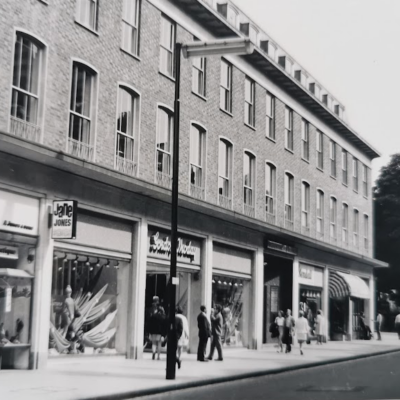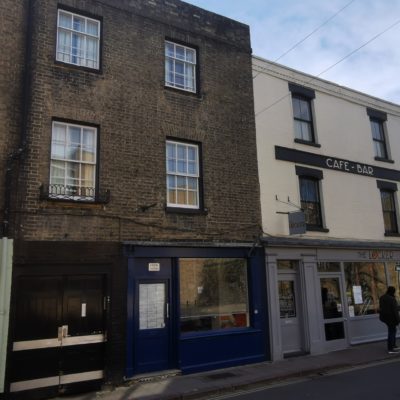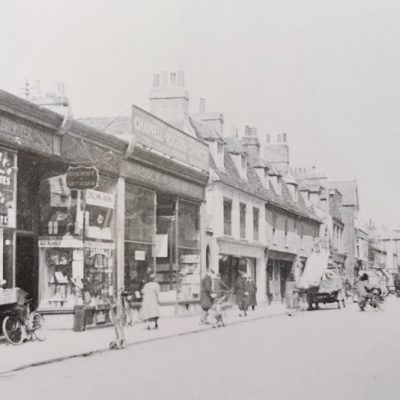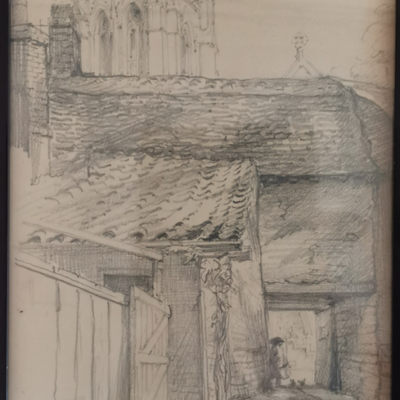Search by topic
- archaeology
- Building of Local Interest
- charity
- church
- crime
- dressmaker
- fire
- Great Eastern Railway
- Listed building
- Mapping Relief
- medieval
- oral history
- poverty
- Public House
- Rattee & Kett
- Religious House
- Roman
- scholar
- school
- Then and Now
- tudor
- women
- work
- world war one
- world war two
Search by text
57 (65) Regent Street
History of 57 Regent Street
1861 (65)
William Finlay, 39, accountant, b Durham
Elizabeth, 40, b Suffolk
Elizabeth Ann, 9, b Cambridge
William Nagle, 45, chaplain H M Madras Estate [? probably a British Army chaplain in India], b Ireland
Elizabeth C, 38, b India
Eliza Lofts, 19, servant, b Essex
1869
William Dixon, a student of Christ’s College, was lodging with the Finlay at the time of his death on 13th February 1869. He had gone with a friend, Charles Frederick Booty, in a boat to Grantchester. They had fallen out of the boat and William had drowned.
Report of Inquest in Cambridge Chronicle 20/2/1869
THE FATAL BOAT ACCIDENT AT GRANTCHESTER.
We regret to have to record that on Saturday afternoon last a fatal accident occurred to Mr. William Dixon, an undergraduate of Christ’s College. It would appear that the deceased, who we believe was an orphan, and friend, Mr. Charles Frederick Booty, at two o’clock proceeded to the boat-station Queens’ bridge, kept by a man named Johnson, and there hired a small boat known as an Eton skiff. There was only room in the boat for one person to scull and one to steer. The deceased sculled and Mr. Booty, who was a good swimmer, had charge of the rudder. The two proceeded up the river towards Grantchester, the river, which is at the best of times about this spot tortuous and dangerous in its course, being rendered still more so by reason of floods occasioned by the late downfall of rain and snow. There was also a strong wind blowing. On the return, about half-past three o’clock, the boat capsized, owing to getting grounded on the bank, and the stern being driven foremost in the stream, and the deceased leaning over the side to get an oar which had slipped out, both deceased and Mr. Booty became immersed in the stream. The latter was an excellent swimmer, but deceased could swim but little, and seemed to have not been able to keep himself above water. Mr. Booty managed to get safely to bank, and immediately jumped into the stream again to rescue his companion, and getting hold of him succeeded in supporting him for some time, but could not get him to bank. At last Mr. Dixon became perfectly lifeless, and his companion, unable to bear his weight, was compelled to abandon him, regard being had to self-preservation. In reaching the shore Mr. Booty gave the alarm, drags were procured, and although every effort was made to find the body throughout the whole of Sunday, it was not until nine o’clock on Monday morning that a person named Andrews succeeded in bringing the body of deceased to bank. It was then decided that an inquest should be held the same afternoon, and half-past four o’clock was fixed as the hour to hold the same. The body had been removed to the Red Lion, Grantchester, and it was there that F.Barlow, Esq., coroner, decided to hold THE INQUEST.
The jury having been sworn proceeded to view the body, which was placed in an adjoining room. , The Master of Christ’s College, Dr. Dickenson, friend of the deceased, and the Rev. W. M. Gunson, Tutor of the College, were present during the hearing. The first witness examined was The Rev. W. M. Gunson, Fellow and Tutor of Christ’s College, who deposed—Deceased was an undergraduate of that College. His name was William Dixon, and I believe he was in his 22nd year. He was admitted student of the College in October last. He was reading with Mr. Potts, of Parker’s Piece, Cambridge, some time before he entered the College. The body I have seen is that of William Dixon. I do not know that the deceased was at all subject to fits.
By a Juryman: Deceased did not lodge in the College, but at 65, Regent street.
Charles Fredk. Booty, undergraduate of Christ’s College, said—I have been intimate friend of the deceased since he has been in College. The deceased was a member of the Boat Club, but did not row in matches. He was accustomed to going up the river towards Grantchester in a boat. On Saturday I accompanied deceased in a boat towards Grantchester. It was a light rowing skiff; I was steering and deceased was sculling. There was only one seat in the boat for sculling. Deceased hired the boat from boat-house next to Queens’ Bridge, the owner being Mr. Johnson, When we got to within a quarter of a mile of the Grantchester Mill, we were rowing over the flooded meadow, and the boat grounded the bank between the meadow and the river. The fields adjoining the bank of the river were flooded. We were crossing from the meadow into the stream of the river when we grounded. We pushed off from the bank after a good deal of trouble, and the stream carried the boat round stern foremost, being very rapid at the time. The boat bumped against a tree and one of the oars slipped out. The tree was on the side of the bank; the oar floated down the stream, and caught in the branch of tree little further down.The rudder of our boat caught in the branches of the tree we were under, and we managed to pull the rudder away from the branches, and the boat then floated down to the tree where the oar had caught. I then tried to recover the rudder-lines, which had got washed out of the boat and were floating in the water; and while I was doing so, I believe deceased leant over the boat to recover the lost oar. The boat gave a sudden jerk and turned right over. We were both immersed in the water. I could swim, but deceased, who used to say he could a little, did not seem to be able to. We both caught hold of a bough of a tree that was hanging over, and being rotten, came off into our hands. We then caught hold of the keel of the boat, and the boat went down under water, and then, as we were near to the bank, deceased caught hold of a tree close to him—a willow growing on the bank—and I swam to the next tree, and climbed up on to the bank. Deceased called out to me to come and help him. I saw be had got his arms round the tree, and I thought he was as safe as I was. I turned round to him and called out for him to get round to the other side of the tree, so that he might get on to the bank. Almost at the same moment that I was speaking, deceased suddenly left go of the tree with his arms, and was carried out into the middle of the stream. Seeing that be could not swim, I jumped into the river and caught hold of his waistcoat by the shoulder, and told him to strike out with his hands, thinking it was best for him to make for the other side. He struck out for a moment or two, and then suddenly became quite still,being a dead weight upon me to hold him .Directly after deceased became still. I felt him to be sinking gradually; his head and shoulders were under water. I kept pulling hard at him the whole time, keeping myself afloat with one band. I then began to feel all my strength going, and, the stream drawing deceased’s body underneath me, I was compelled to leave go, and I felt his body touch my foot. I had no one to render any assistance until after I got out, which I did by pulling myself on to the bank by taking hold of a bush. Some gentlemen with canoes came up, and, asking what had happened, I pointed out the place where deceased had gone down.
By Juryman : I got out on the Trumpington side. One of the gentlemen went for drags, and I crossed the river in a canoe, and walked on to Cambridge. The accident happened, I should think, about half-past three. When I arrived at Cambridge I sent word Mr Gunson, tutor Christ’s College, informing him of the accident.
P.C John Cotton Longstaff, of Trumpington, deposed: On Saturday evening, about half-past six oclock. I heard of the accident, and at once commenced an inquiry. Knowing that it was no use to drag the river that evening, there being so much water, I made arrangements with the friends of deceased to drag the river at daybreak on the following morning. On Sunday I met P.c. Edwards, P.c. Ash, and some other men, and having provided ourselves with drags and boats, proceeded to search for the body.We proceeded to drag the river all day on Sunday, but with no success.I received a pea jacket, a pair of gloves, a pocket handkerchief, and number of letters which were found in deceased’s jacket. This morning those who were employed to drag the river met again at daybreak and proceeded with the work. At ten minutes to 9 oclock Mr. Andrews hooked up the body. It was taken at the centre of the stream about 50 yards from where the deceased was said to have sank. As soon as the body was brought on shore I took possession of it and assisted in bringing it to this house. On searching the clothes which the deceased had on, I found a silver watch, a gold chain, and various other articles. The watch had stopped at ten minutes to four oclock. This afternoon I received from the landlady of the inn a purse containing, a blank cheque, some postage stamps and cards, which had been found in the boat.The purse had been found there by Mr. Johnson, the owner of the boat, who gave it to the landlady.
The CORONER said he thought that was all the evidence that it would be necessary to call. The jury in this case would have no difficulty coming to a conclusion to the cause of death. There seemed to be no blame attached to any one, except that it was a dangerous thing to attempt to go that portion of the river when there was a flood. The deceased must have been a very strong man to have been able to row the river against so strong a flood. With regard to Mr. Booty, who had given his evidence in a very straightforward manner, he deserved every possible praise for the manly way in which he risked his own life in endeavouring to save that of his companion. It was not every one who would have ventured on so perilous a task, in trying to rescue a man much heavier than himself. It was clear from the evidence that the cause of death was purely accidental, and no other verdict could be returned. The Jury coincided with the view taken by the Coroner, and returned a verdict of “Accidental Death.” The body was then handed over to the friends of deceased for burial. We are informed that deceased was a very promising young man in his college. The funeral of deceased took place on Wednesday last, at the Mill-road cemetery, in the presence of a large number of spectators. The service was very impressively read by the Rev. Dr. Cartmell, Master of Christ’s College, assisted by the Rev. John Martin, Vicar of St. Andrew’s the Great.
1901 (65)
Kate Matilda Webb, cousin, 46, assistant fancy bazaar, b Wilts
Mary Ann Wehrle, lodger, 67, living on own means, b Cambridge
1913 (57)
Mrs Day, registry for servants
Madame Witcomb, dressmaker and costumier
1962
H W Dean and Son, surveyors
Contribute
Do you have any information about the people or places in this article? If so, then please let us know using the Contact page or by emailing capturingcambridge@
License
This work is licensed under CC BY-NC-SA 4.0









